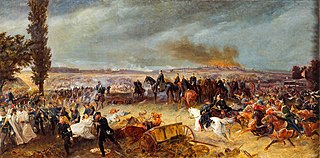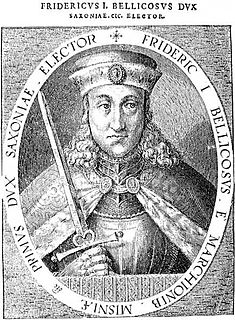 W
WThe Austro-Prussian War or Seven Weeks' War, known in Germany as Deutscher Krieg and by a variety of other names, was fought in 1866 between the Austrian Empire and the Kingdom of Prussia, with each also being aided by various allies within the German Confederation. Prussia had also allied with the Kingdom of Italy, linking this conflict to the Third Independence War of Italian unification. The Austro-Prussian War was part of the wider rivalry between Austria and Prussia, and resulted in Prussian dominance over the German states.
 W
WThe Austro-Turkish War (1663–1664) or fourth Austro-Turkish War was a short war between the Habsburg Monarchy and the Ottoman Empire. The Ottoman aim was to resume the advance in central Europe, conquer Vienna and subdue Austria. The Ottomans managed to capture key strongholds, however, the Habsburg army under Raimondo Montecuccoli succeeded in halting the Ottoman army in the Battle of Saint Gotthard.
 W
WThe War of the Bavarian Succession was a dispute between the Austrian Habsburg Monarchy and an alliance of Saxony and Prussia over succession to the Electorate of Bavaria after the extinction of the Bavarian branch of the House of Wittelsbach. The Habsburgs sought to acquire Bavaria, and the alliance opposed them, favoring another branch of the Wittelsbachs. Both sides mobilized large armies, but the only fighting in the war was a few minor skirmishes. However, thousands of soldiers died from disease and starvation, earning the conflict the name Kartoffelkrieg in Prussia and Saxony; in Habsburg Austria, it was sometimes called the Zwetschgenrummel.
 W
WThe Campaign of Grodno was a plan developed by Johann Patkul and Otto Arnold von Paykull during the Swedish invasion of the Polish–Lithuanian Commonwealth, a part of the Great Northern War. Its purpose was to crush Charles XII's army with overwhelming force in a combined offensive of Russian and Saxon troops. The campaign, executed by Peter I of Russia and Augustus II of Saxony, began in July 1705 and lasted almost a year. In divided areas the allies would jointly strike the Swedish troops occupied in Poland, in order to neutralize the influence the Swedes had in the Polish politics. However, the Swedish forces under Charles XII successfully outmaneuvered the allies, installed a Polish king in favor of their own and finally won two decisive victories at Grodno and Fraustadt in 1706. This resulted in the Treaty of Altranstädt (1706) in which Augustus renounced his claims to the Polish throne, broke off his alliance with Russia, and established peace between Sweden and Saxony.
 W
WThe Fourth Coalition fought against Napoleon's French Empire and were defeated in a war spanning 1806–1807. The main coalition partners were Prussia and Russia with Saxony, Sweden, and Great Britain also contributing. Excluding Prussia, some members of the coalition had previously been fighting France as part of the Third Coalition, and there was no intervening period of general peace. On 9 October 1806, Prussia joined a renewed coalition, fearing the rise in French power after the defeat of Austria and establishment of the French-sponsored Confederation of the Rhine. Prussia and Russia mobilized for a fresh campaign with Prussia massing troops in Saxony.
 W
WThe Franco-Prussian War or Franco-German War, often referred to in France as the War of 1870, was a conflict between the Second French Empire and the North German Confederation led by the Kingdom of Prussia. Lasting from 19 July 1870 to 28 January 1871, the conflict was caused primarily by France's determination to restore its dominant position in continental Europe, which it had lost following Prussia's crushing victory over Austria in 1866. According to some historians, Prussian chancellor Otto von Bismarck deliberately provoked the French into declaring war on Prussia in order to draw four independent southern German states—Baden, Württemberg, Bavaria and Hesse-Darmstadt—to join the North German Confederation; other historians contend that Bismarck exploited the circumstances as they unfolded. None, however, dispute that Bismarck likely recognized the potential for new German alliances, given the situation as a whole.
 W
WThe Great Northern War (1700–1721) was a conflict in which a coalition led by the Tsardom of Russia successfully contested the supremacy of the Swedish Empire in Northern, Central and Eastern Europe. The initial leaders of the anti-Swedish alliance were Peter I of Russia, Frederick IV of Denmark–Norway and Augustus II the Strong of Saxony–Poland–Lithuania. Frederick IV and Augustus II were defeated by Sweden, under Charles XII, and forced out of the alliance in 1700 and 1706 respectively, but rejoined it in 1709 after the defeat of Charles XII at the Battle of Poltava. George I of Great Britain and the Electorate of Hanover joined the coalition in 1714 for Hanover and in 1717 for Britain, and Frederick William I of Brandenburg-Prussia joined it in 1715.
 W
WThe Saxon Fratricidal War was a war fought between the two brothers Frederick II, Elector of Saxony and Duke William III over Wettin ruled areas from 1446 to 1451. After a dispute over the division of certain family lands between Frederick II and William III, the Division of Altenburg eventually led to growing tensions between the two brothers and an inability to agree on who ruled which areas. After failed attempts at reconciliation, the war broke out and lasted for five years. The war was destructive and had no clear winner before being ended with a peace treaty at Naumburg. Following the war and subsequent divisions the Saxons lost much of their former power and influence within the different German states and families.
 W
WThe Tyrolean Rebellion of 1809 was a rebellion of peasants in the County of Tyrol led by Andreas Hofer against the occupation of their homeland by the French and Bavarian troops within the context of the War of the Fifth Coalition against Napoleon I.